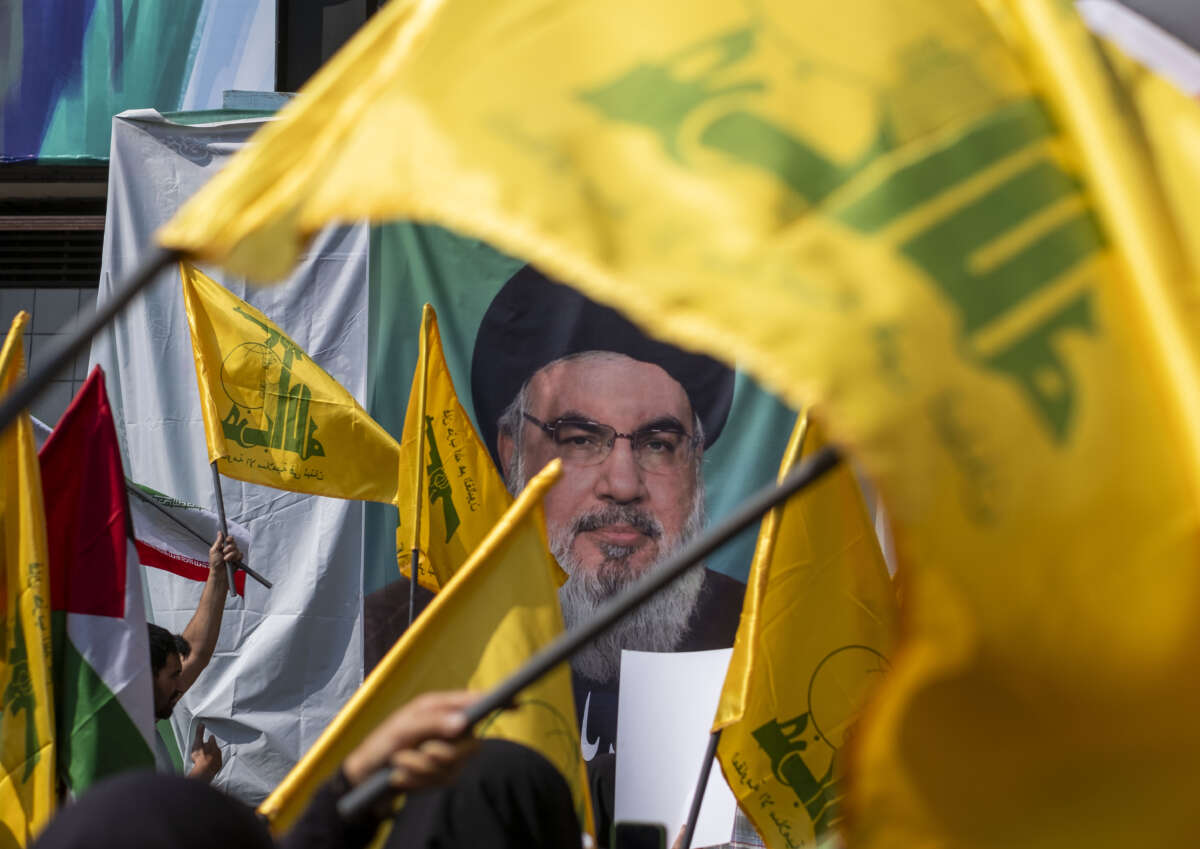Support justice-driven, accurate and transparent news — make a quick donation to Truthout today!
The Secretary General of Hezbollah, Hasan Nasrallah, was killed by the latest Israeli carpet-bombing of Beirut’s southern Dahiya district on Friday, according to an official announcement by the Lebanese resistance group on Saturday afternoon.
Israel had bombed a residential block in the Haret Hraik area in the Dahiya district with several 2000-pound bunker-buster bombs. The massive airstrike leveled an entire residential block and completely flattened at least six residential buildings.
Israeli media outlets first reported that Nasrallah was the target of the strike, while AFP and Reuters quoted sources described as “close to Hezbollah” saying that he was still alive. On Saturday morning, the Israeli army officially announced that it had confirmed the killing of Nasrallah, and a few hours later, Hezbollah published a statement confirming the news.
Since late Friday, Israel put its forces on full alert along the Lebanese border, calling two reserve units to duty, and opening public shelters in several cities, bracing for a Hezbollah retaliation.
Hezbollah expanded its rocket reach on Saturday to central Israel and even the central West Bank. Israeli air defenses intercepted Hezbollah’s rockets near Ramallah a few hours before Hazbollah’s official announcement of Nasrallah’s death.
Israel’s escalation comes as the U.S. and other European countries say they are trying to reach a ceasefire deal on the Lebanese border. Israel has pledged to secure the return of evacuated Israelis to the north, while Hezbollah continues to refuse to cease the activity of the “support front” in solidarity with Gaza unless Israel ends its war on the besieged coastal enclave.
Since Israel began its offensive on Lebanon last Monday, it has killed at least 1,250 Lebanese and wounded more than 5,000.
Who Is Hasan Nasrallah?
Nasrallah was born in 1960 in a working-class neighborhood in Burj Hamoud near Beirut. He pursued religious studies in Iraq while engaging in political activity in the ranks of the Amal movement, a Lebanese Shi’a-based political group founded by Shi’a cleric and politician Musa al-Sadr, by whom Nasrallah was inspired.
In Iraq, he met his mentor Abbas Musawi, and both men became close friends. Musawi and Nasrallah later quit the Amal movement and co-founded Hezbollah in the early 1980s following Israel’s invasion and occupation of Lebanon in 1982.
In the late 1980s, Hezbollah became an increasingly important component of the Lebanese resistance to Israeli occupation, with Nasrallah becoming a member of its political leadership. In 1992, Israel assassinated Abbas Musawi alongside his wife and newborn son. Nasrallah succeeded Musawi as Secretary General of the movement. In 1997, Nasrallah’s son, Hadi Nasrallah, was killed in action during combat with Israeli forces in southern Lebanon, contributing to the growth of Nasrallah’s popularity.
Nasrallah led Hezbollah through successive Israeli offensives against the movement, starting with the July 1993 offensive. In 1996, Nasrallah oversaw Hezbollah’s operations during Israel’s offensive, “Grapes of Wrath,” ending in a historic agreement that stipulated avoiding the targeting of civilians from both sides. In May 2000, Nasrallah led Hezbollah during the Israeli withdrawal from Lebanon and announced victory in an iconic speech in the border city of Bint Jbeil. He then led Hezbollah through the 2006 Israeli war on Lebanon, which ended with a full Israeli withdrawal and ceasefire, and catapulting Hezbollah’s status as the first resistance movement to successfully repel an Israeli military invasion. Two years later, Hezbollah concluded a prisoner exchange deal with Israel that saw the release of hundreds of Lebanese, Palestinian, and other Arab detainees from Israeli jails.
In 2012, Nasrallah announced Hezbollah’s involvement in the Syrian Civil War, siding with the Syrian regime of Bashar al-Asad. Under Nasrallah’s leadership, Hezbollah played a central role in defeating Syrian rebels, and later ISIS in Syrian territory and on Lebanon’s borders. The war propelled Hezbollah to a position of regional influence, even as it lost support among sectors of the Lebanese and Arab populations in the broader region that supported the Syrian opposition.
Throughout his political and military career, Nasrallah became famous for live and televised speeches and unconventional forms of “public diplomacy,” watched by millions across the region — including Israelis.
As Hezbollah’s third secretary general, Nasrallah left his post vacant for the first time in 32 years. Lebanese media outlets and several analysts already began to expect that his successor will be Hashem Safiyuddin, who currently serves as the chief of the movement’s executive council.
Media that fights fascism
Truthout is funded almost entirely by readers — that’s why we can speak truth to power and cut against the mainstream narrative. But independent journalists at Truthout face mounting political repression under Trump.
We rely on your support to survive McCarthyist censorship. Please make a tax-deductible one-time or monthly donation.
